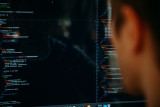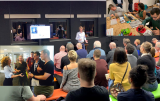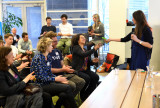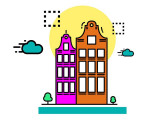Stay in the know on all smart updates of your favorite topics.
Capture the world with data - Tech for Society recap

Friday 5 June 2020, the fourth edition of the Tech for Society series was launched in Pakhuis de Zwijger: a livestream series about the role of technology in a society that is currently under pressure of the Covid-19 crisis. The central theme of this edition: ‘Dataism’, defined as the believe that the world can be captured in data and algorithms. This concept makes us question its practical possibilities and how we could understand the world around us using data. How should we?
Miriam Rasch, researcher and teacher, wrote the book ‘Frictie. Ethiek in tijden van dataisme’. The book talks about dataism, which Miriam describes as a belief that everything in the world can be captured with data. It is the idea that collecting data shows you certainties and predictions about the world and this way, directs people and the society as a whole . Miriam calls it a ‘religion’, since ‘dataism could exclude other views.' Data look objective and neutral. Believers of this concept, therefore, see it as a necessity to make decision-making processes data-driven.
Martijn de Waal, researcher in the Lectorate of Play & Civic Media of the Amsterdam University of Applied Sciences, recognizes this dataism in the world. As a kind believer of dataism himself, Martijn looks at the concept as a way to organize information and shape the world around us. ‘However, the central role of collecting data now, as done by platforms such as Facebook or Amazon, is too big. It is pretended as if data are objective and truthful. But collecting data is done via platforms with all kinds of underlying values, that are not always visible.’
Which kinds of values? And are these public values? Can the data work for people?’
At the Biennale of Urbanism and Architecture in Shenzhen in China, Martijn attended the exhibition ‘Eyes of the City’, where he found three interpretations on the usage of data:
- Using data to map the lives of people and with the data, force them to live life according to rules and punish them if you do not oblige the rules. One of the main examples is face recognition in China.
- Luxurious capitalism. Collecting large amounts of data on citizens and use these to offer services. Even services people don’t know they need until they are offered to them. For example, offer a coffee to people on the streets at the moment you know they would like a cup of coffee due to the data that you collected about them. There is a downside for people working in the platform economy who have to be available, according to the data.
- In Shenzhen, companies got into contact with migrants living in a certain area. Together they collected data about bottlenecks in their lives. It helped people to show authorities they exist. The data collected are not objective, but it could be a starting point for discussion.
Policy based on data, data based on policy
In research, the usage of data is really important. Even more when policies are based on the data obtained during these studies. However, according to Caroline Nevejan, Chief Science Officer at the City of Amsterdam, you have to be transparent about the sources you used, data that are collected, and start a discussion about which statements could be seen as true or false. In a democracy everybody has to take a part in this process, which is of extreme importance in a world full of propaganda and fake news. In one of her researches, City Rhythm, she analyses the real world and the digital world and the interaction between these two. She addresses questions such as; can we trust data and can we use data for good? How can the digital world can become a part of the physical world? An example of this is, can people who like gardening can use the help of people who don't like gardening, but do like measuring and predicting growth of plants?
Arjan Widlak, director of the Kafka brigade, researches bureaucratic dysfunctioning: ‘Bureaucracy is a great asset, it ensures that all kinds of values materialize - such as legal certainty, integrity, but often this goes the wrong way. Some organizations do the opposite of what they should do. There is indifference without a much needed check.' The Kafka Brigade wants to come to manageable knowledge and people that care about bureaucracy. What kind of system are we creating when we digitalize the government? We are caught in a system of possibilities and impossibilities, where principles of responsible IT should be defined and carried out.
How do we make sure that these principles are put into practice?
Arjan: 'For example, when you drive too fast, you will be flashed. This is done automatically, as is the determination of the fine and the envelope that will be sent to you. It seems like there are no humans involved in the process. Although we might not all understand how this system works, we have a high trust in the way it functions. You have done something wrong and result is a fine. The confidence in the operation of the system is great because it functions without people and people are unreliable. But ultimately people are involved. There is a policy behind this process and people decide what is legal and what is not. Certainly, due to affairs and scandals, it is not certain whether the confidence in these techniques is still so big. So data are not objective. These are human creatures. You cannot take the people out, then you will lose ethics and the discussion about what is wrong or right.'
Constutional state and education
Caroline: ‘Data collecting functions in the constitutional state, in the city. Collect, acquire, return data has to be done according to certain laws. You can also go to court if this is done wrong. The European Rules for Data Protection (GDPR) are essential for the protection of personal data collected by companies. Companies now say, give us more rules because this works for us. We can do better business. So business runs better in a democracy’ .
Caroline continues: “Another aspect we have to look at is how data scientists are trained. What do they learn? It is staggering to see how data science education in university only has one course on responsible innovation. In collecting data we only talk about ethics, never about the rule of law. Business is always about social entrepreneurship, never about trade unions. In education, we create data scientists who have only one side of the knowledge, but get all the power. Because we did not teach the system designers how to think about democracy, power and the inequality of power.”
Martijn: ‘Yes, people in Silicon Valley work in a one-dimensional way. But this will change. There is more and more attention for ethics because students also ask for it. They want to contribute to society.’
Arjan: 'It is interesting how this also goes for the background of civil servants. This has a major influence on how the government functions. A long time ago, as a civil servant it was common practice to know something about constitutional law. You had to understand that values get meaning to each other.' Caroline: ‘Place this standards frame to the forefront again. Democracy and privacy by design. This makes it possible to discuss the interpretation of meaning.’
What can the current timeframe learn us?
Miriam: ‘We learned the value of not using tech all day. I hope we can remember it.’
Caroline: ‘Ask more questions every day. Even if you take something for granted.’
Arjan: ‘Yes, ask more questions. We can strive for privacy by design, but what does that mean? I plea for critical citizenship.’
Martijn: ‘This time showed us a revaluation for public space and values. Public space is suddenly used a lot more. What can that look like online?’
According to Amsterdam Smart City, the discussion of this evening is exactly the discussion that needs to take place. Collecting data is very useful to work on the challenges in our cities. But we have to be aware that these data are not neutral and we have to have a discussion about the issues and if the data are necessary to help solving the issues. Can we work on public values with the data? This asks for a collaboration between the public and private sector, something we work on every day. Amsterdam Smart City always puts public value first: innovating together and transparent, using each other’s expertise, with the resident at the centre.
Do you want to watch the full episode? You can watch it here (in Dutch):
[##### Tech for Society #4: Dataïsme: Is de wereld te vangen in data?
Wie heeft gelijk als de computer het fout heeft?
Pakhuis de Zwijger](https://dezwijger.nl/programma/dataisme-is-de-wereld-te-vangen-in-data%20%20%20)
AI4Cities Open Market Consultation - GLOBAL WEBINAR

AI4Cities is looking for artificial intelligence (AI) solutions in the fields of mobility and energy to accelerate our path to carbon neutrality.
The project's first Open Market Consultation webinar is open to suppliers, manufacturers, entrepreneurs, startups and other experts, who are able to consult in the following domains: climate change, AI software and hardware development, public traffic management and planning, energy efficiency and infrastructure, and building maintenance.
The AI4Cities Buyers Group will present the project's goals, its pre-commercial procurement tool, and its phases. This is the first AI4Cities global event in which the demand and the supply side will meet.
AI4Cities is looking for artificial intelligence (AI) solutions in the fields of mobility and energy to accelerate our path to carbon neutrality.
The project's first Open Market Consultation webinar is open to suppliers, manufacturers, entrepreneurs, startups and other experts, who are able to consult in the following domains: climate change, AI software and hardware development, public traffic management and planning, energy efficiency and infrastructure, and building maintenance.
The AI4Cities Buyers Group will present the project's goals, its pre-commercial procurement tool, and its phases. This is the first AI4Cities global event in which the demand and the supply side will meet.
Agenda
- 10:00 Introduction* *to the AI4Cities project – Kaisa Sibelius, Coordinator AI4Cities, Forum Virium Helsinki
- 10:15 Mobility – City of Stavanger, Nils Henrik Haaland
- 10:25 Energy – City of Amsterdam, Anja Reimann and Mimi Eelman
- 10:40 Open AI for agile cities – Timo Ruohomäki, Programme Director, Forum Virium Helsinki
- 10:55 What is a Pre-Commercial Procurement process? – Hugo Gonçalves, PCP Specialist, Forum Virium Helsinki
- 11:10 Questions and answers
- 11:20 End
Tech for Society – can an app save the world?

Last Friday, the second edition of the Tech for Society series was launched in Pakhuis de Zwijger: the livestream series about the role of technology in a society that is under pressure of the corona crisis . With this time a special focus on the contact-tracing apps. What do you think: can an app save the world?
Last Friday, the second edition of the Tech for Society series was launched in Pakhuis de Zwijger: the livestream series about the role of technology in a society that is under pressure of the corona crisis. With this time a special focus on the contact-tracing apps. What do you think: can an app save the world?
Why is tracking, contact-research, of an infectious person so important in times of corona? Mariska Petrignani, infection control doctor at GGD (public health service), explains: “GGD’s most important work at the moment is finding out who’s been in contact with an infected person to prevent rapid spreading of the infection. We do this by relying on the memory of the infected person. But there are always contacts you can’t recall or don’t know by name, for instance people you saw in the supermarket or public transport. But the question we have to ask is: to what extent are these people at risk for exposure and on what level do they contribute to the transmission of the disease?" There’s a lot of scientific discussion surrounding this topic.
According to Mariska, GPS-tracking, which can be recorded via an app, can help but doesn’t cover all relevant information. Is there a wall between you and the person you are in contact with? That is the type of information you need to know as well.
Michiel Heidenrijk, director of the Amsterdam Health & Technology Institute, adds to the discussion: “Can an app save the world? There is not one silver bullet, you need a combination of different therapies/solutions. Technology and data can offer parts of the solution.”. Mariska adds: “A common problem is that people can’t recall exactly where they have been. Technology can help. There are many ways to support this and it doesn’t have to be a contact-tracking app. For instance you can use your phone as a digital agenda to log your movements. We should think about other smart, digital solutions.”. Michiel: “We should embrace technology, use data, but it should be used in a sufficient and reliable way.”.
Hannes Grassegger, tech-journalist based in Zurich, sketches the European perspective. After a two week testing period of a contact-tracing app in Zurich, the app will be launched mid-June in Swiss. It’s completely voluntary, but hosted by the federal government, which is highly trusted by the public.
But isn’t it time for a broader European strategy? Hannes explains that coming week E-health will publish guidelines for the European common strategy for contact-tracing apps, to align the European members. E-health does not see the app itself as a major tool to bring back the freedom of movement between the member states, but they try to develop a framework to avoid the app becoming an obstacle to reintegrating the freedom of movement within Europe. Hannes: “If we have different states within Europe using different apps, there is need to have a set of common ground rules.”.
Lotje Siffels, philosopher in technology, conducts research on the influence of big-tech companies in the healthcare sector. She wants to stipulate two important discussion points: i) Technology is often seen as THE solution to the whole problem, while the problem is a lot more complex. It almost seems like the exit strategy is entirely depending on the use of contract-tracing apps. While this is certainly not the case; ii) Privacy is broadly mentioned within the discussion, but there are so much more social values that have to be discussed as well. Think about autonomy or democratic values. As an example Lotje mentions the ‘zwaai-app’: “If you meet someone or accidentally bump into someone, you wave with your phone and the data of the other person is saved. This helps you log your movements while being conscious of the data that is stored. You give a level of autonomy back to the people, because they are the ones consciously keeping track of their own encounters.” Active participation can also be part of the solution.
Lotte Houwing, policy advisor at Bits of Freedom, is the last speaker of the evening and raises questions surrounding the necessity of such an app. Do we actually want this app? What exactly is the problem we need solved? What are the advantages and disadvantages? What is the impact on our society? She adds that these questions need to be answered first before we can assess if an app is indeed the right tool to implement.
The discussion of this evening is exactly the discussion that needs to take place. Amsterdam Smart City beliefs in technology as a means, never as a goal. Before thinking about contact-tracking apps, the right questions need to be raised and answered. Amsterdam Smart City always puts public value first: innovating together and openly, using each other’s expertise, with the resident at the centre.
Do you want to watch the full episode? You can watch it here (in Dutch): <https://dezwijger.nl/programma/kan-een-app-de-wereld-redden>
Amsterdam Trade and Innovate & DutchBasecamp are looking for smart health companies!

Calling for smart health companies with international ambitions! The internationalisation program ‘The Globaliser’, with a special focus on smart health companies (startups, scale-ups and SME’s), starts in the Amsterdam region in October. During this 10 week program, companies will work on their internationalisation strategy. The program, put together with experienced entrepreneurs, contains the most valuable lessons learned, individual coaching, expert views, interactive sessions and utilizes useful tools for market selection, building the Go-to-Market strategy and the international roadmap. Afterwards, participants will have a validated international roadmap, which gives focus and helps you to roll out your smart health solution internationally. Do you want to know more? Get in contact with Ellen van der Vossen, (e.vossen@amsterdam.nl) or Daan Donkers (d.donkers@amsterdam.nl), who are trade developers for Amsterdam Trade and Innovate.
For more information about the Globaliser, check out https://www.dutchbasecamp.org/globaliser!
Participants needed for a fun virtual session about responsible technologies in public spaces.
Do you wish to live in a world where everything you do is being monitored by the government like the world described by George Orwell in his novel 1984 or how about be sent to jail before even committing a crime like in the movie and novel Minority Report? I think not then what kind of world do you want to live in? It is a fact that smart technologies are here and governments usage of them is an inevitable future and if we wish for them to use these technologies responsibly then we must first ourselves must know how they should be used. Come be part of a fun virtual session where I will help you reflect a bit on what you desire from your city and in turn, you help me a design master student with his graduation thesis. To participate you can fill this form: https://form.jotform.com/200902554050039 and for the information, you reach out to me
Future City & imec

The third online get-together by FCF is Thursday, 2 April at 3 PM (CET). This weeks guest speaker is Valerio Panzica La Manna of the R&D and innovation hub imec, on how real-time air quality monitoring leads to better decision making in a city. Join our weekly event and meet smart city enthusiasts from all over the world. Participation is free, all you need to do is bring your own drink and snack and you will be good to go.
Join the City of Amsterdam Innovation Team!
Do you like to work on complex urban issues involving multiple stakeholders and with direct effect for the Amsterdammer? From AI and data science, to smart mobility and circular economy, there are a number of opportunities to join the CTO innovation team.
Check out these current opportunities:
AI developer
Back end developer
Business developer (AI Team)
Data engineer
Data scientist (Smart Mobility Program)
Front end developer
Full stack developer
Project manager (MaaS & shared mobility)
Technical information analyst (Smart Mobility Program)
Tech lead circular economy
For complete information and application procedure, refer to the City of Amsterdam’s website: https://www.amsterdam.nl/bestuur-organisatie/werkenbij/externe/
Or mail us for any questions: innovatie@amsterdam.nl
Join the online get-together with Future City & FIWARE

Thursday 26 March, 3 PM (CET)
Following the success of the first Future City Foundation (a FIWARE iHub) online get-together with Wim Willems, Councilor of the City of Apeldoorn, the Netherlands, and more than 90 Smart City enthusiasts, this week’s online get-together on Thursday, 26 March at 3 PM (CET) goes international with the participation of the FIWARE Foundation.
Together with its members and partners, the Foundation as a global ecosystem is driving the definition and open source implementation of key open de-facto standards that enable the development of portable and interoperable Smart Solutions in a faster, easier and affordable way. It hereby avoids vendor lock-in scenarios whilst also nourishing a sustainable and innovation-driven business ecosystem.
Participation is free, all you need to do is bring your own drink and snack and you will be good to go.
REGISTER NOW: https://future-city.nl/join-the-online-get-together-with-future-city-fiware/
FIWARE Foundation CEO, Ulrich Ahle, will be joining the get-together to talk about FIWARE. The FIWARE Catalogue offers a curated framework of open source platform components that can be assembled together and with other third-party platform components to accelerate the development of Smart Solutions. It hereby enables a landscape of diverse but interoperable Smart City solutions. Ulrich Ahle will give a short talk on how FIWARE is changing cities worldwide and how municipalities and companies can apply FIWARE solutions. His talk will be followed by a Q&A session where it will be possible to ask Mr. Ahle questions.
We look forward to an interactive online event, after which we will raise our glasses together!
How Do You Participate?
Registration is free and simple: Register on the website for the event: https://future-city.nl/join-the-online-get-together-with-future-city-fiware/
You will then receive an email with the link to take part at 3 PM (CET) on Thursday (26 March). Participation is free of charge and the online event will be in English.
Who is Organizing The Event?
Together with its partners, the only FIWARE iHub in the Netherlands is hosting the online get-togethers.
REGISTER NOW: https://future-city.nl/join-the-online-get-together-with-future-city-fiware/
Next Level #1: Eerlijke algoritmen

Nieuwe technologietalkshow met o.m. wethouder Rutger Groot Wassink, CTO Amsterdam Ger Baron en techfilosoof Martijntje Smits.
Algoritmen zijn overal en bepalen steeds meer in ons dagelijks leven. We gebruiken het voor de beste smartphone foto's, maar ook bij misdaadpreventie en het opsporen van fraude bij de sociale dienst. Maar hoe neutraal is deze onzichtbare spelverdeler? Hoeveel van onze voorliefdes of vooroordelen nemen deze systemen over? En hoe krijgen we hier grip op? In onze nieuwste talkshow - Next Level - spreken we over de impact van technologie op onze samenleving.
Photo by Charles on Unsplash.
Lidar - A New Canvas For 21st Century Landscapes

Lidar is what robots use to read and navigate our built environment. Also known as point cloud or 3D scanning, Lidar becomes a wonderful 'black canvas' to paint a new portrait of our digital surroundings. We created a point cloud scan animation of the Marineterrein in the heart of Amsterdam that revealed the many data sets being collecting in our living lab. Like Bob Ross, we used the data and points to paint to a new landscape explaining our 21st century city.
Check out how we created this animation here: http://tapp.nl/point-cloud-scan-animation
I'll be giving alking about the point cloud animation and process at the upcoming Sensemakers AMS talk “DigitalTwins - cities, neighborhoods and infra” 19 February 2020. Signup here: http://meetu.ps/e/Hwyjq/8dXgR/a
Conscious Cities

How might we automate access to a public digital ecosystem for citizens and machines in order to grow a conscious city? How might we incentivize all citizens and companies to interact with the public digital ecosystem of the city in order to improve livability, democratic representation and societal engagement?
Read our ecosystem document
Join our online ecosystem platform
Digital Twins; cities, neighbourhoods & Rail-infra

This evening we will have three practical perspectives & applications of "digital twins":
- Tanguy Coenen from Imec will share their insights and best practises within the Digital Twin City of Antwerpen
- Marcel Gerrits & Paul Kootwijk on practical applications of IoT and AI to help ProRail manage themaintenance, safety & security of the railwail infrastructure
- Tom van Arman from CITYXL & TAPP on the digital twin of the Marineterrein
Wanted: Launching customer for AI SMART SURVEILLANCE
At Oddity.ai, we make video surveillance smart by recognizing violence, real-time. When violence occurs under the eye of the camera, an alert to the surveillance staff is being sent, so they can act accordingly. In the contemporary camera surveillance environment, a LOT is being missed, which we counter by applying our smart deep-learning algorithm.
We have demonstrated the effectiveness of our solution during a pilot in Eindhoven (Living Lab Stratumseind). Currently, we are still monitoring that location, with great results. We also accurately detected several fights which were missed by the surveillance staff (!)
When implemented, fights can be deescalated in an early stage, and perhaps even prevented.
We are now searching for a customer (police/municipality/Living Lab/etc.) that implements our solution in the surveillance room. It is already market-ready and privacy-compliant.
Oddity.ai is a university spinoff (Utrecht University) with three co-founders and two employees. We are based in Utrecht, but flexible to implement anywhere in The Netherlands. Please contact me (Thomas Alflen, co-founder and director of Oddity.ai) if you would like to know more!
Smart Data, Smart City: Data dilemmas #3: The International Edition

Amsterdam Smart City, Boston and Reykjavik would like to explore with you which decisions are needed for responsible use of data.
The possibilities of data and new technologies for urban challenges are endless. We use data to make cities safer, cleaner and, for example, more accessible. But what happens to all data that is collected? Who may collect them? Which dilemmas do we encounter when we collect (personal) data to improve the city? Which choices did people make and why? Which considerations play a role?
These questions are important for everyone; for governments, residents and companies. Amsterdam Smart City would like to explore with you which decisions are needed for responsible use of data.
In part 1 we discussed the opportunities of Tada: a manifesto for the responsible use of data and a 3D model for Amsterdam. In part 2 we discussed the role of bottom-up initiatives in measuring data. The third edition will be an international exchange!
Amsterdam, Reykjavik and Boston will share some of their most important projects currently going
on. They will share the data choices they came across and tell you which decisions they made.
Date: 2nd of December 2019
Location: Datalab, Weesperstraat 113, Amsterdam
Program:
15.45: Walk-in
16.00 – 16.05: Introduction by Leonie van den Beuken, program director Amsterdam Smart City
16.05 – 16.20: Smart City Hilversum platform by Atos + discussion
16.20 – 16.35: Questioning the ethics of technology implementations by Jaclyn Youngblood, Mayor’s Office, City of Boston + discussion
16.35 – 16.50: Bike data commons by Sander van der Waal, Waag + discussion
16.50 – 17.05: An integrated data warehouse and challenges/dilemmas by Óli Páll Geirsson, Chief Data Officer, City of Reykjavik + discussion
17.05 – 17.20: Plenary discussion and wrap-up
17.20 – 18.15: Drinks & laughter
Photo: Hans Kleijn
De Digitale samenleving

Hoe beïnvloedt digitalisering de maatschappij? Twee jaar na het verschijnen van de onderzoeksagenda "Digitale samenleving" van de Vereniging van Universiteiten (VSNU) blikken vier betrokken onderzoekers terug op de afgelopen periode.
Wat kunnen de onderzoekers nu zeggen over de manier waarop digitalisering alle aspecten van het dagelijks leven bereikt en verandert? Ze reflecteren op het onderzoek en laten zien waar de vragen liggen. De sprekers gaan ook in op de rol van de wetenschap in het beantwoorden van die vragen.
Democratizing Technology

How can individuals regain control of their personal data? And how can we align the digital world with public values that we foster in our society? This event showcases the valuable work that has been done by DECODE in both Amsterdam and Barcelona; and other initiatives that are fighting to reclaiming the digital space for public good, with a specific focus on Public Spaces. The speakers will share practical solutions for responsible data management, applications and lessons learned.
Speakers:
Evgeny Morozov (writer & publicist)
Marleen Stikker (founder & director Waag)
Francesca Bria (founder & director DECODE)
Nina Boelsums (Dyne & starter of referendum on privacy law NL)
Aik van Eemeren (CTO office Municipality Amsterdam)
Smart Humanity

KNVI heeft als meerjarig thema ‘Smart Humanity’. Het definiëren en introduceren hiervan is een taak die KNVI heeft opgepakt vanaf januari 2018. De beroepsorganisatie heeft drie jaar uitgetrokken voor dit thema. Met diverse wetenschappers en practitioners wordt het begrip Smart Humanity verder uitgewerkt. KNVI publiceert tevens diverse boeken en artikelen over het onderwerp. En we organiseren met de beroepsgroep onze grote jaarevents, dit jaar voor de tweede keer!
Het thema Smart Humanity uitwerken gebeurt in een proces met practitioners en wetenschappers. Zij hebben verschillende beelden over de impact van technologie en de wisselwerking daarvan met de maatschappij:
• De een verwacht dat robots en algoritmes de wereld overnemen,
• de ander ziet een prachtige samensmelting van mens en cybernetica,
• terwijl weer anderen de mensheid via de inzet van technologie de vervuilde aarde zien terugbrengen naar een biologisch juiste balans.
In ieder scenario is het uitgangspunt dat de mensheid het aan zichzelf verplicht is, om het beste uit haar eigen uitvindingen te halen ten gunste van de menselijkheid.
Met andere woorden, informatieprofessionals máken technologie en helpen bij het implementeren van deze technologie. Ze zijn zowel makers als gebruikers als opleiders. Ze faciliteren andere mensen en organisaties in de toegang tot INFORMATIE. Met andere woorden: Informatieprofessionals bewaken de ethiek en het welzijn van de mensheid in relatie tot de inzet van technologie en de gevolgen van opeenvolgende disruptieve golven in de maatschappij. Deze bevindingen zijn in 5 thema’s samengevat die tijdens het event aan de orde komen. Tijdens Smart Humanity 2019 vindt gedurende de dag tal van kennis -, inspiratie – en creatiesessies plaats.
Royal Haskoning signs Tada

We’re thrilled to have Royal Haskoning RHDV as a signatory of the Tada (https://tada.city/) movement in #Amsterdam.
"We know that the promise of using data can be huge – and this ties in closely in our collaboration with City of Amsterdam to optimise peopleflows in the city centre," says Frank Legter (Director Business Unit Transport & Planning Europe) "But we must ensure that we collect data correctly and enable people to stay in control of their data so that we create responsible digital cities."
Workshop Machine Learning for Research

Are you a researcher and do you have a challenging research question that might benefit from machine learning, deep learning or AI? And do you have the data to start working on this question? If so, this workshop is for you.
Tell us about your idea and your team (3-5 people). From all submitted ideas we will invite up to five teams to spend a week of hands-on work with two machine learning experts. Together, we will explore your data in order to find the best machine learning strategy with which to tackle your scientific question. The workshop will be a collaborative effort in which we will share knowledge, develop and explore new ideas and boost your understanding of current machine learning techniques.
At least two team members should be based at a Dutch university or research institute that is affiliated with NWO, KNAW, universities for applied sciences (“hogescholen”), or TO2. Proposals can come from any scientific domain. The workshop will be free of charge (1-week workshop including lunch, but no travel expenses or accommodation costs).
Requirements:
A team
This workshop is a collaborative effort and we ask for submissions from teams of between 3 and 5 people. Your fellow members should all share a strong interest in the proposed research question, but may be as diverse as you like and can range from students to professors and include different disciplines, faculties, levels of expertise, etc. We strongly encourage submissions from teams comprising a diverse mix of researchers from different universities or institutes.
Data
To get the most out of this one-week workshop, the data you want to work with must be available for use during the workshop. Before accepting a proposal, we may ask you to let us briefly inspect the data in order to make sure it is ready to be used for hands-on work during the workshop. If you are unsure whether your data is suitable, please don’t hesitate to contact us before applying.
Basic programming skills
We do not expect expert-level programming skills or prior experience with machine learning, as long as you are keen to learn new things. However, at least some team members should have basic programming experience so that we can focus on actual hands-on work during the workshop. Since we will work in very small teams, we can easily adapt to your level of expertise.
If you’re still worried you might not have the right computational skills, please feel free to contact us.
How to apply?
To apply, please visit: https://www.esciencecenter.nl//workshop-machine-learning-for-research
Deal between Yandex.Taxi and “Vezyot”, 5G testing and appointments in telecom

It is highly unlikely that Yandex.Taxi will purchase the assets of “Vezyot” GC , as planned before. In response to the taxi aggregator Gett’s complaint, the Federal Anti-Monopoly Service might not allow to conclude a deal in some regions of Russia, where it can have a negative impact on competition. In this case the the Service will order shareholders not to sell assets or sell them to another competitor. Alfa-Bank analysts consider that Mail.ru Group’s “Citymobil” is the most probable competitor to buy the assets of “Vezyot” in the regions.
In July Yandex claimed it planned to buy the software and call-centers of “Vezyot” GC and therefore submitted an application to the Federal Anti-Monopoly Service. Mail.ru Group claimed that the parties had to obtain a written permit for asset purchasing from Mail.ru Group, which gave a convertible loan to “Vezyot” in 2018. In return “Vezyot” replied they had not broken lending laws.
Yandex.Taxi IPO launch was planned for 2019 or 2020. According to a recent evaluation, the service costs $7.7–8.5 billion, while the whole Yandex’s capitalization costs $12.4 billion.
In Moscow Yandex.Taxi’s (together with Uber) taxi aggregator market share is over 68%, and “Vezyot” only has 2% of shares. At the same time across Russia Yandex.Taxi has about 47% of shares, while “Vezyot” has 24%. in Moscow Gett got 5.7% market shares and in the whole Russian market it got 9.7%.
According to Discovery Research Group, the Russian taxi aggregator market’s monetary value was estimated at 290.5 billion rubles in 2018 (146.8 billion in the previous year). Analysts note that aggregators put conventional taxi companies under the control of IT companies.
Telecom news
• Beeline launched a 5G pilot testbed in “Luzhniki” and broadcasted it via social networks. The operator claimed during testing they recorded 3.3 Gbps speed per one Huawei device.
• MTS in turn tested Solutions for smart transport in the pilot area in VDNH and presented 3 5G use case scenarios to increase on road safety — “Smart overtaking”, “Smart crossroad” and “Safe pedestrian”.
• First official news about the anticipated reorganizing of the Moscow broadband internet service provide leader, MGTS, came out. From September 16, its Director General Pavel Kuznetsov also holds the position of the MTS Moscow region Director, previously held by Igor Egorov. Previously the news about MGTS reorganization was reported by “Kommersant”. The information about new appointments in top management is stated in the operator’s documents, though MTS had not commented on it yet.
• Moreover, this week MTS launched a ticket selling platform “MTS Afisha” and plans to open “MTS Live Arena” concert venue for up to 11.5 thousand people. It Will be located near “Skolkovo” innovation center.
• Vitaliy Klishin was appointed Director of the Moscow branch of “ER-Telecom”. He previously held the position of Vice President of “AMT-Group” and worked for “Volga Telecom” and “AKADO”. He will start modernizing the network and increasing revenues, including B2B segment, which the company has been working in since last autumn.
• Tele2 obtained the permission to continue eSIM testing from the Ministry of Communications. The Ministry stated that the operator fixed all eSIM security issues and the test algorithm full supports subscriber identification. Up to 15 thousand subscribers will participate in the testing.
Retail for online
Experts note that one of the trends in telecom retail is the openness of the infrastructure for partners within the concept of digital services department store. Last week two pieces of news were dedicated to the examples of such cooperation.
MTS in its phone stores will offer clients to install a set of apps with Yandex services (Yandex.Browser, Yandex.Taxi, Yandex.Drive and Auto.ru)on their smartphones. The internet company’s apps will be available in other retail stores.
Megafon in its phone stores allowed users to verify their identity in Yandex.Money. This option is also available in “Svyaznoy”, “Euroset” stores and “Unistream” offices.
Stay up to date
Get notified about new updates, opportunities or events that match your interests.

